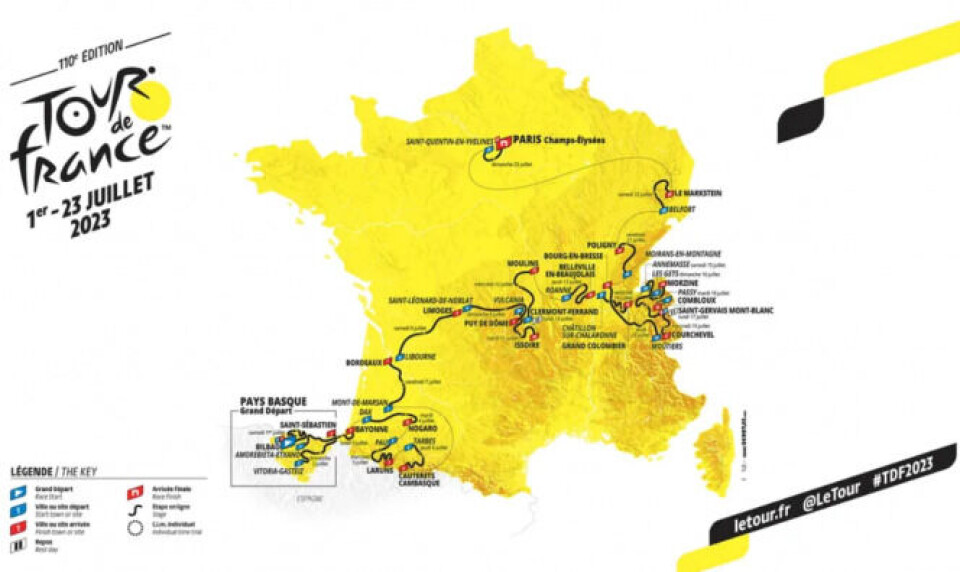-
Pistes closed, confinement orders: Alpine resorts deal with avalanche risk
Increased snowfall this weekend may cause further closures as busy school holiday season continues
-
Former French Interior Minister announces 2027 presidential candidacy
Bruno Retailleau recently asked prefectures to be tough on immigration
-
Ryanair axes Dublin-Rodez route but London connection retained
“We are disappointed but had no say in decision” say airport authorities
Tour de France 2023 route unveiled: Will it pass near you?
The men’s race will begin in the Spanish Basque Country and include four summit finishes
The Tour de France 2023 men’s route has been revealed, including four summit finishes, one time trial and another foreign start.
Read more: Why are Tour de France cyclists called ‘runners’ in French?
The 110th edition of the race will begin in Bilbao in the Spanish Basque Country on July 1, where the competitors will spend two days before crossing the border into France and finishing day three in Bayonne. From the first day, there will be 3,300m to climb.
“For the start in the Basque Country, where we will find one of the best crowds in the world, we have made sure to highlight the beauty of the coasts, the seaside, but also the hills,” said Christophe Prudhomme, the race’s director.
The last time the race began in Spain was in 1992, and it is relatively rare for the event to begin in a southern location. In 1977 and 1979, it started in Fleurance (Gers), in 1981 and 2020 it was Nice, in 2009 Monaco and in 2013 Corsica.
Once the race arrives in France, there will be two stages spent in the Pyrenees, with competitors climbing the Col de Soudet and the Col de Marie-Blanque one day, and then the Col d’Aspin, du Tourmalet and de Cauterets the next.
While the 2022 race favoured northern France in its early stages, and began even further north in Denmark, next year’s event will centre largely on the southern half of France.
After the Pyrenees, the racers will head for the Massif Central, their ninth stage setting off from Saint-Léonard-de-Noblat and finishing at the summit of Puy de Dôme, which the Tour has not visited for 35 years.
“This is an emblematic place in the history of the Tour de France, with the duel between Jacques Anquetil and Raymond Poulidor [the veteran and the underdog who battled to the top of the volcano in 1964],” Mr Prudhomme said.
“It is a legend of the Tour.”
The competitors will spend five stages in the Alps, which will offer the leaders a chance to get ahead. Climbs will include Grand Colombier, Morzine and Saint-Gervais Mont Blanc.
There will also be a time trial over 22km between Passy and Combloux during the 16th stage, and a 17th stage involving 5,100m of climbing including the Cormet de Roselend and the Col de la Loze.
The penultimate stage will end at the top of Le Markstein in the Vosges Massif, and then the racers will be transferred to Paris for the final day of the Tour.
On July 23, the participants will begin at France’s national velodrome in Saint-Quentin-en-Yvelines, and race around the course until they finally travel up the Champs-Élysées to their finish line.

Map credit: ASO / Tour de France
Related articles
























